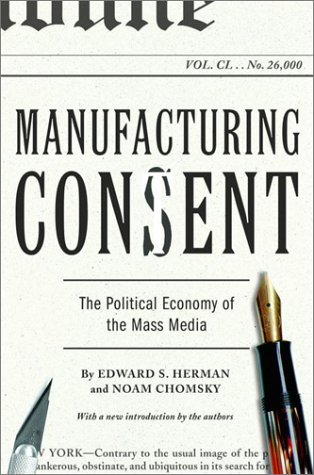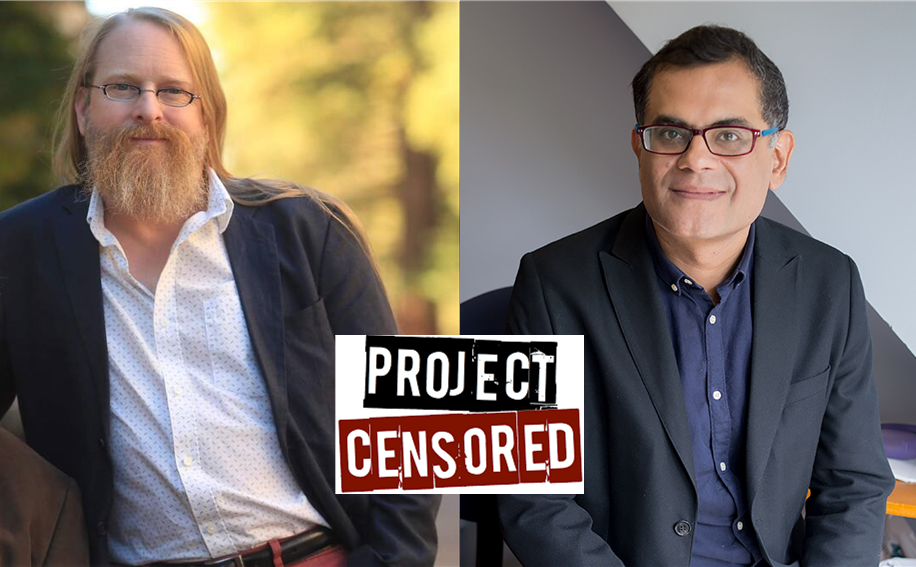Unlike Corporate News, Indy Media Treats People as Citizens; “Not as Consumers, Not as Objects”
The U.S. faces numerous crises that our media infrastructure is struggling to address, stressing the need for critical media literacy and journalism education. Project Censored Director Mickey Huff brought in Raza Rumi, Director of the Park Center for Independent Media (PCIM) at Ithaca College, on the July 17 Project Censored Show to discuss how coverage of emergencies ranging from gun violence to climate change demonstrates how independent media succeeds where corporate press fails to inform a citizenry.
Rumi opened by thanking Huff, as well as Ithaca College and the Park Foundation for PCIM’s 15 years of operation. He said PCIM is possibly unique in the U.S. in its mission at an institution of higher education to promote and teach independent media. Such outlets stand as an alternative to the CNNs and MSNBCs of the world, which people tend to regard as the default news sources.
Rumi explained that alternative and independent media streams become relegated to footnotes in our present and past. “But the reality is that American history is also a history of dissent,” Rumi said. Historical independent publications of the 18th, 19th, and 20th century worked to abolish slavery, end racial discrimination, and secure rights for children, workers, women, and LGBTQ people. “These movements were led by journalists, by publishers, by writers,” Rumi said, “and they still are.”
But for the historical prominence of establishment press, “it is so much interlinked, interlaced with the rise of capitalism,” Rumi said. Government and media had to control narratives after World War II and during the Cold War, which they achieved through what Noam Chomsky and Edward Herman called manufacturing consent. Rumi explained, “How do you prepare people to wage war? How would people accept that today the U.S. is spending more than $800 billion on defense while there is no direct threat to the country from any of its neighbors?” It requires a media machinery that commodifies the news to sell the ‘right’ stories.

“Manufacturing Consent” by Edward S. Herman and Noam Chomsky
Capitalist incentives undergird establishment journalism, especially after the rise of advertising in the ’50s changed the way people consume news media. “I use this word ‘consume’ very pointedly because it means that the news is a product or commodity to be sold on the shelf,” Rumi said. “It is not there to inform, to educate, to enlighten, to expand your horizons or your understanding of the world. No, it is about how many clicks now or how many viewers on TV.”
Five Examples of Corporate Media Distortion
This news-as-commodity model represents potent danger for public information, especially in the face of poor critical thinking and media literacy. Rumi outlined five topics he considers particularly egregious under this combination, beginning with gun violence. Corporate coverage almost always centers the shooter and his mental health problems rather than the guns themselves, “and their manufacturers, and their promoters, and the politicians who take money for that,” Rumi said. “And the entire ecosystem which promotes violence as a bedrock of American society, right? Nobody wants to talk about that.”
Healthcare also suffers in the news. When Rumi came to the U.S. from Pakistan, he heard commentators on the radio disparaging public healthcare in favor of private. “I was stunned, I said, how is it possible that people are saying that public healthcare is a bad thing? That making a workforce, a citizenry, healthy and protecting against disease or other threats, life threats, is something bad?”
Especially as fires in Canada deteriorate air quality and record heat becomes fatal across the globe, climate change demands better reporting. Rumi cited the recent U.N. International Panel on Climate Change (IPCC) report, which spelled out the catastrophic threat of global warming in the next 10 to 20 years. Huff punctuated Rumi’s point, mentioning how oil and gas giant Exxon sponsored the Heartland Institute to give the “both sides” version of climate change stories, in a stark example of corporations manipulating the narrative.

Heartland Institute report earns an “F” from scientists on Climate Feedback.
And despite the U.S.’s proud history as a nation of immigrants, a xenophobic narrative has taken hold of establishment news. “On mainstream TV, almost always, immigration officials are taken as sources,” Rumi said, but rarely migrants themselves. Immigrant demonization feeds directly into the “xenophobia, Islamophobia, and Trumpism that we are encountering.” But, Rumi added, “Trumpism is not something that came with Trump. It already was there, thanks to corporate media.”
Lastly for Rumi’s five problematic media topics is poverty. Rumi asks his students each semester how many people live under the U.S. poverty line, and no one at the undergraduate or graduate levels knows. “And I don’t blame them because … CNN never talks about it. The New York Times doesn’t put in the headline. It doesn’t come on their phone.”
By extension, discussion of class in general remains scarce in establishment stories, as the news cycle surrounding the Titanic submersible highlighted. “Any human being in that particular situation — we value human life,” Rumi said. “But the kind of coverage that was given, I mean, was so disproportionate.” Rumi cited the hundreds of migrants, including 209 Pakistanis, who died in boat wreck off Greece and were eclipsed in the news by five wealthy people in the submersible.
The migrants off Greece “obviously were not risking their lives for fun or adventure, OK, so the class difference was completely overlooked … not to offend the sensibilities of their pristine readers.” Rumi added, “It’s all very clear how corporate media sets up the news agenda, the political agenda.”
Higher Education Crisis
Huff turned the conversation to higher education, noting its state of disrepair amid neoliberal policy and corporatization. He asked, “How do you teach journalists to not just be stenographers to those in power,” but instead foster media literacy and meaningful civic engagement?
Rumi pointed to the key lesson that “Independent media treats human beings as citizens of a particular country, of a particular world — not as consumers, not as objects, not as commodities. You know, and that is the primary difference.” This consumer-driven mentality that bogs down establishment press links to the dire condition of higher ed.
“There’s a crisis in the humanities, as we know already. Philosophy, history, etc. have been traditionally undermined, have been underfunded now in many places,” Rumi said, “because it is something that makes or shapes a citizenship, a person who’s engaged with the world, instead of a person who would go and fit as a small cog in the corporate machine.”
Teaching students about the history of dissident movements, instead of seeing journalism as the role of an outside observer, should be an imperative of a journalism education, Rumi argued. Dissident movements “were part and parcel of the of the process of social change. In fact, it has been carefully designed since the early 20th century to separate it” such that the political machine, rather than citizens, propel social progress.
Rumi continued, “So for every change, you have to hire lobbyists in D.C., pay them hundreds and thousands of dollars for a simple bill.” In contrast, Bernie Sanders worked to empower citizens, and twice the Democratic establishment blocked him. Rumi said Sanders “has left a lasting legacy over American politics on how to organize, how to defeat big financing, big donors, and the role of dirty dark money.”
Education Should Center Unlearning
Huff introduced an idea from Tim Wise, who urged to lay off STEM in higher ed — that is science, technology, engineering, and math — in favor of MESH: media literacy, ethics, sociology, and history. “If we don’t have those things with STEM, then we just have people making bombs for fun; we have people doing things because they can, not people doing things to help other people.”
As a case in point, Rumi described how nations rewrite history to build themselves. The U.S. has a legacy of slave-owning founding fathers, as well as decimating Native American populations and erasing languages and cultures. “That’s why, whether it’s a journalism student or a liberal arts student, they must go through this sort of unlearning of history that they have been growing up with since middle school.”
Rumi added that people need to be taught from a young age how to determine what is credible and navigate disinformation. And for journalism students, it’s vital to introduce indy press to show in action “no-holds-barred, direct, brave commentary about the world.”
Listen to Huff and Rumi’s full conversation on the Project Censored Show.

